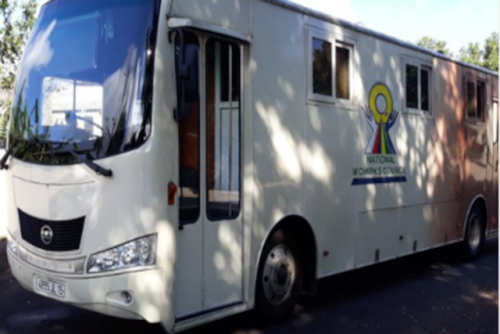What We Do
Social Empowerment of Women / Girls
Sensitisation campaigns on:
- Gender Concept (including breaking stereotypes)
- Women’s Rights as Human’s Rights (in collaboration with the National Human Rights Commission)
- Sustainable Development Goals 5 (SDG 5)
- Women in the economy
- Services from Ministry of Industrial Development, SMEs and Cooperatives
- Job fair
- Women and Climate Change (in collaboration with Ministry of Environment, Solid Waste Management and Climate Change)
- Distribution of Eco bag and plants
- Rain water Harvesting
- Women and health (in collaboration with Ministry of Health and Wellness, Mauritius Family Planning and Welfare Association)
- Awareness sessions on health issues
- Medical checkup (Papsmear test, blood donation, etc)
- Awareness Session on Prevention of HIV/Aids
- Nature trail, culinary exhibitions
- Safety / Risk Disaster
- Road Safety Campaigns
- Crime Prevention and Personal Security
- Training on Risk Disaster Management
- Act
- Jewellery Act
- Consumer Protection Act
- Elderly Act
- New National Women’s Council Act 2016
- Sports Activities
Economic Empowerment of Women / Girls
Short courses / Forum / Debate on:
-
- Women as Entrepreneur (in collaboration with the National Women Entrepreneur Council)
- ELIT – Learning English using IT (in collaboration with National Productivity and Competitiveness Council)
- Financial Literacy
- Grooming, Interview Techniques & CV Writing
- IT Trainings (inc risk of cyber crimes)
- IC3 training
- Coding
- Social Media and its impact on our society
- Adult Literacy Programme
- Dressmaking & Related Craft Courses
Political Empowerment of Women / Girls
Sessions:
- Public Speaking
- Leadership Course
- Communication Skills
- Women in Decision Making
Caravane: "Service De Proximité"
The NWC provides a “Service de Proximité” targeting vulnerable families through the use of a mobile caravan. The mobile caravan has been adapted and refurbished to cater for various services and activities for the full and effective empowerment of women, development of children and welfare of families. The caravan services areas considered as “pockets of poverty” and a specific region is identified for each month.
Objectives of Caravane: “Service de proximité”:
- Provide a “service de proximité” aimed at empowering the socially excluded ones by equipping them with skills, tools and resources to improve their livelihoods
- Provide to these people with coping strategies to move out of the circle of poverty and be integrated in the mainstream of society.
The following stakeholders partner with the NWC:
- Family Welfare and Protection Unit (Ministry of Gender Equality and Family Welfare)
- Child Development Unit (Ministry of Gender Equality and Family Welfare)
- Home Economics Unit (Ministry of Gender Equality and Family Welfare)
- National Children’s Council
- Mauritius Family Planning and Welfare Association (MFPWA)
Services / Facilities provided inside the Caravan:
- Provision of family counseling services
- Cervical Cancer Screening for vulnerable women
- Children’s rights and protection
- Sensitisation on Gender Concept
Courses run by the Council
Test
The Adult Literacy Programme aims at equipping women with basic literacy and numeracy skills required to adapt themselves to the fast changing environment of our modern world, at the same time furthering their self development through Adult Literacy Courses in various outstations throughout the island. Below is the list of Adult Literacy Courses dispensed by the NWC:
Basic Literacy Level One
This course is geared towards meeting the cognitive needs of those who never received any schooling or who do not have any exposure to rudimentary syntax, semantics and phonetics.
Download Syllabus — Apply for Course
Basic Literacy Level Two
This course uses a thematic, authentic and critical approach to facilitate trainees function at ease in real-life situations. The trainees are those who have followed Level One, but need to be exposed to more advanced reading so as to acquire the necessary skills to read advanced text such as newspaper articles, poems, letters and so on. The trainees are encouraged to learn through analysis, synthesis and evaluation of current events.
Download Syllabus — Apply for Course
Adult Literacy for Entrepreneurship Development (ALED) for Women
The Adult Literacy for Entrepreneurship Development (ALED) for Women was tailored to provide relevant skills to women who wish to engage in income generating activities so as to raise their economic situation and to promote their autonomy in small-scale enterprises. It is also geared towards helping housewives to prepare their monthly budget to reduce the incidence of getting into debt.
Download Syllabus — Apply for Course
Kreol Morisien
This course aims at providing the trainee with grammar, basic phonetics spelling rules, idiomatic expressions and sentence structures in Kreol Morisien so as to enhance speaking and writing in the mother tongue, as the use of one’s own language is deemed crucial for the intellectual development of a person.
Download Syllabus — Apply for Course
The National Women’s Council in collaboration with National Productivity and Competitiveness Council (NPCC) and National Empowerment Foundation (NEF) has launched an English Literacy using Information Technology (ELIT) Programme.
The aim of the programme is to empower individuals with low academic background to effectively use a mobile phone so as to be able to access different facilities such as mobile banking e.g payment of bills, checking of balance, doing transfers; online shopping; searching for information and so on.
Objectives of Mobile English Literacy using IT (ELIT) Programme:
- To develop their potential communication abilities and to participate effectively in society
- To develop the possibility for further education and increase their employability
- To improve their creative skills
- To facilitate intergeneration learning
- To bridge the digital divide by using ICT as a tool to make learning more interesting, interactive and flexible
Dressmaking and Related Craft Courses are provided to women for their skill development through various courses covering a wide range of fields. The curriculum of the dressmaking and related craft courses includes:
In this course, students learn the art of manipulating the appearance of fabrics and other materials through traditional, stylized, and illusory techniques to make a product fashionable. They learn to develop their own language of colour, pattern and texture. Surface design covers a wide variety of techniques comprising stamping, image transfer, marbling, stenciling and nature painting. Duration: 12 weeks per module (once a week).
Modules:
- Fabric Painting
- Glue/Stone/Sponging
- Glass/Ceramic painting
- Madhubani
- Warli
Course Content:
- Apply knowledge of drawings, structured and technical drawing
- Knowledge of materials; tools and equipment
- Select appropriate technique on related modules
- Define the element and principles of art
- Organize drawing to communicate objects or ideas
- To mount products
- Packaging
The course provides an overview of the embroidery concepts and techniques. Students are apprised of multiple types of embroidery stitches. Embroidery adds colour, texture, richness, dimension and is executed in treads of cotton, silk or linen may also incorporate other materials such as beads, shells, feathers or metal. Duration: 12 weeks per module (once a week).
Modules:
- Basic Hand Embroidery
- Brazilian Embroidery
- Ribbon Embroidery
- Chinese Embroidery
Course Content:
- Knowledge on embroidery stitches accordingly to module
- Identify proper tools and equipment
- Transferring design motif technique
- Combination of color thread according to design and fabrics
- Cutting and folding techniques
- Sewing and neating process
- Finishing raw edge not limited to picot
- Ironing and packaging
- Health and Safety
Handicraft, precisely expressed as artisanal handicraft (homemade or handmade), is any of a wide variety of work where useful and decorative objects are made completely by hand, machine or by using simple tools and materials. It is a traditional main sector of craft and applies to a wide range of creative and design activities that are related to making things with one’s hands and skill, including work with textiles, mouldable and rigid materials, paper, planters, etc. Duration: 12 weeks per module (once a week).
Modules:
- Basketry
- Rug Making
- Patch Work
- Quilting
- Sewing
- Batik
- Pyrography
Course Content:
- Rules and Regulations
- Health and Safety
- Identify appropriate tools and equipment
- Work out design according to materials
- Prepare templates
- Identify accessories/materials to garnish products
- Assembling pieces
- Marking, cutting, mounting and drying process
- Trimming, ironing and packaging
This course provides trainees with a short time frame for the skills required, and the confidence, to go on the make quality hand sewn window dressings and complimentary soft-furnishing. Students learn to decorate the interior space of a building. Whether you wish to learn a new skill, or set up your own business, our courses are tailored to suit all levels of ability, including absolute beginners. A high percentage of people go on to set up their own interior design business following training with us. Duration: 12 weeks per module (once a week).
Modules:
- Living room set
- Kitchen set
- Cushion Making
- Home Decoration Design
Course Content:
- Rules and Regulations
- Health and Safety
- Knowledge of tools and equipment
- Knowledge in textile fabric
- Operating single lockstitch and overlock machine
- Identify product and select appropriate fabrics
- Layout, marking, cutting and tacking process
- Stitching
- Apply accessories and embellishment
- Neating/ironing and packaging
Crochet and knitting craft are courses where students learn two different basic techniques using different type of tools, crochet hook and knitting needles. Students are acquainted to various types of yarns, wools and threads. Students develop the ability to handle crochet hook and needles efficiently and learn to follow patterns from Crochet/Knitting books to produce items. Duration: 12 weeks per module (once a week).
Modules:
- Crochet
- Knitting
Course Content:
- Rules and Regulations
- Health and Safety
- Identify different types of tools and equipment for Crochet and Knitting Craft
- Identify appropriate materials according to size, weight…
- Knowledge of yarn
- Making of corners
- Picoting
- Ability to hand Crochet hook and knitting needles
- Select accessories for embellishment
- Lining and packaging
The course helps students to make use of left overs or unused materials to create or restyle products in their own way using home accessories. Many household products can be repurposed into decorative items. Bags are made from patterns cutting to sewing and students learn to mould, shape, place handles and make pockets. Paper is rolled, looped, curled, twisted and otherwise manipulated to create design to decorate greeting cards, pictures, boxes. Strip of paper is rolled into a coil and then pinched into shapes that can be glued together. Duration: 12 weeks per module (once a week).
Modules:
- Bag Making
- Paper Craft
- Quilting
- Recycling and Relooking
Course Content:
- Rules and Regulations
- Health and Safety
- Discuss on Eco Products variation
- Identify appropriate materials/ raw materials
- Knowledge of accessories
- Identify appropriate tools and equipment
- Prepare templates
- Cutting process
- Mounting process
- Embellishment
- Matching trimmings accessories and Ironing/packaging
Beads Craft is the art of attaching beads to one another by stringing them with a sewing needle or beading needle and thread or thin wire. Students learn simple and practical techniques followed by new techniques like loom and offloom weaving, beads knitting and 3D beading to create products of their own choice. The emphasis is on developing confidence and realizing the potential for making jewellery with limited access to equipment and skills. Duration: 12 weeks per module (once a week).
Modules:
- Beads Work
- Jewellery Work
Course Content:
- Briefing: Rules and Regulations
- Health and Safety issues
- Display of products sample
- Identify proper tool and equipment
- Identify appropriate accessories
- Select appropriate beads not limited to crystal beads – size, shape and weight
- Apply necessary techniques
- Counting skills
- Practical exercise according to beads size and design
- Colour combination
- Mount product according to participant need
- Packaging
Other Major Programmes
Mentoring Programme
In a bid to reinvigorate the Women’s Movement and make it more vibrant, the Mentoring Programme, an ambitious initiative to encourage young women/girls to regroup themselves into Young Women’s Associations is being implemented. The objectives of the project are:
- To engage the young population as active participants in the promotion of GEWE
- To promote a spirit of social integration and team work among women leaders
- To encourage young girls and women to act as advocate for their rights
Mentors were recruited to facilitate the setting of young women’s associations and the latter were trained on Gender Concept, History of Women’s Movement and Importance of Young Women’s Movement.
Legal Literacy Programme
The NWC is implementing the Legal Literacy Programme in a bid to make women aware of:
- The various machineries/organs of the Justice delivery system available to redress their problems/ grievances
- The procedure of approaching and utilizing various channels available to redress their grievances i.e. the Police, the Executive and the Judiciary
- The role of Courts in achieving gender equality, most importantly the concept of public interest litigation
- To impart practical knowledge on basic legal rights and remedies provided under various laws, thereby making women fit to face the challenges in real life situations
A booklet is currently been designed by a Legal Resource Person, following which, awareness sessions would be organized around the island to disseminate about the content of the brochures and to ensure that women and girls are well-informed of their right to legal aid, as well as about the criminal justice system.






